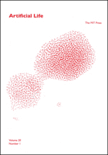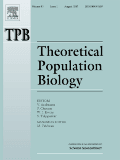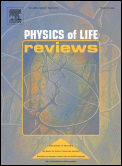
ARTIFICIAL LIFE
metrics 2024
Unveiling the Complexities of Artificial Organisms
Introduction
ARTIFICIAL LIFE, published by MIT PRESS, is a premier academic journal dedicated to the interdisciplinary study of artificial life, exploring the intersection of biology, computer science, and related fields. With an impact factor that reflects its influential contributions—especially highlighted in its Q3 rankings in Artificial Intelligence, Biochemistry, Genetics and Molecular Biology, and Ecology, Evolution, Behavior and Systematics—the journal serves as a critical platform for researchers, professionals, and students alike. Originating in 1995, ARTIFICIAL LIFE continues to publish cutting-edge research that pushes the boundaries of our understanding of life-like systems, both natural and synthetically designed. Despite having limited open access options, the journal’s role in fostering innovative discussions and advancements in its field cannot be overstated, making it an essential resource for anyone engaged in the study and application of artificial life concepts.
Metrics 2024
 0.41
0.41 1.60
1.60 1.70
1.70 63
63Metrics History
Rank 2024
Scopus
IF (Web Of Science)
JCI (Web Of Science)
Quartile History
Similar Journals

JOURNAL OF COMPUTER AND SYSTEMS SCIENCES INTERNATIONAL
Unveiling the Dynamics of Software and Systems EngineeringJOURNAL OF COMPUTER AND SYSTEMS SCIENCES INTERNATIONAL, published by PLEIADES PUBLISHING INC, serves as a vital platform in the fields of Applied Mathematics, Computer Networks and Communications, Computer Vision and Pattern Recognition, Control and Systems Engineering, Information Systems, and Software among others. Established in 1993, the journal offers insights into both theoretical and practical advancements within these disciplines, continuously evolving through to 2024. Its current impact is reflected in its Q3 rankings across multiple categories in 2023 and Scopus rankings that position it within the 15th to 33rd percentiles, showcasing its relevance within the academic community. While not an Open Access journal, it maintains accessibility through institutional subscriptions, ensuring that researchers and professionals can engage with high-quality content. The journal is instrumental for those looking to deepen their understanding and contribute to ongoing discourse in computer science and systems sciences, making it an essential resource for students, researchers, and industry practitioners alike.

THEORETICAL POPULATION BIOLOGY
Bridging Theory and Practice in Population StudiesTHEORETICAL POPULATION BIOLOGY is a leading academic journal published by Academic Press Inc. Elsevier Science, dedicated to advancing the understanding of population biology through theoretical frameworks and models. With an ISSN of 0040-5809 and an E-ISSN of 1096-0325, this journal has been a cornerstone in its field since its inception in 1970. Recognized for its significant contributions to the study of ecological and evolutionary dynamics, it currently holds a Q2 ranking in the Ecology, Evolution, Behavior and Systematics category as per the 2023 category quartiles. Researchers and professionals alike appreciate its role in disseminating impactful findings, as reflected in its percentile ranking of the 51st in Scopus for the Agricultural and Biological Sciences field. While the journal is not open access, it remains a vital resource for those looking to deepen their knowledge and research in theoretical approaches to population biology, making it an essential read for students, aspiring scientists, and veteran researchers seeking to engage with cutting-edge theoretical developments.

JOURNAL OF LOGIC AND COMPUTATION
Pioneering Insights in Logic and Computational ScienceJOURNAL OF LOGIC AND COMPUTATION, published by Oxford University Press, is a leading peer-reviewed journal dedicated to advancing research in the intersections of logic, computation, and theoretical frameworks of computer science. With an ISSN of 0955-792X and an E-ISSN of 1465-363X, the journal has established itself within academic circles, boasting significant impact evidenced by its category quartiles, including a Q1 ranking in Arts and Humanities (miscellaneous) and a Q2 in Logic for 2023. This prestigious journal emphasizes interdisciplinary approaches to understanding computational systems, hence targeting a diverse audience of researchers, professionals, and students keen on exploring provocative questions in logic and computation. Although not open access, the content is highly valuable, reflecting contemporary challenges and advancements in the field. With over three decades of published work, spanning from 1990 to 2024, the journal continues to contribute richly to the discourse surrounding logical methodologies and computational innovations, making it an essential resource for those engaged in these dynamic areas of study.

Nonlinear Dynamics Psychology and Life Sciences
Exploring the Complex Interplay of Mind and LifeNonlinear Dynamics Psychology and Life Sciences is a leading journal published by the SOC CHAOS THEORY PSYCHOLOGY & LIFE SCIENCES, focusing on the intersection of nonlinear dynamics and psychological phenomena as well as their implications in life sciences. With an ISSN of 1090-0578 and an E-ISSN of 1573-6652, this journal stands out as a reputable source of innovative research and analytical studies that contribute significantly to the fields of applied mathematics and psychology. By delving into the complex behaviors and patterns of dynamic systems, the journal addresses vital contemporary issues, making it essential reading for researchers, professionals, and students alike. Although it operates on a traditional access model, the journal's insights are invaluable for understanding the empirical background behind nonlinear dynamics in psychological research. Recognized within the academic community for its contributions, it holds a 2023 Scopus ranking of #436 out of 635 in the Applied Mathematics category, placing it in the 31st percentile, and it is designated as Q3 in its quartile categorization. As a bridge between theoretical foundations and real-world applications, Nonlinear Dynamics Psychology and Life Sciences aims to foster interdisciplinary dialogue and inspire future research in this exciting and evolving field.

BIOLOGICAL CYBERNETICS
Exploring the Intersection of Biology and TechnologyBIOLOGICAL CYBERNETICS is a premier journal published by SPRINGER, dedicated to advancing the fields of biotechnology and computer science through the lens of biological interactions. With an ISSN of 0340-1200 and an E-ISSN of 1432-0770, this esteemed journal has been a cornerstone of academic research since its inception in 1961 and is set to continue influencing the landscape of biological cybernetics through 2024. The journal currently holds a Q3 ranking in the Biotechnology category and a Q2 ranking in miscellaneous Computer Science according to the 2023 category quartiles, showcasing its credibility and impact in the interdisciplinary nexus of these fields. Although it does not provide open access options, researchers and students can engage with its innovative content that includes original research articles, reviews, and methodologies that explore the computational modeling of biological systems and the integration of artificial intelligence in biological research. With its strategic location in the United States and a robust publication record, BIOLOGICAL CYBERNETICS remains an essential resource for anyone looking to deepen their understanding and application of cybernetic principles within biological contexts.

Computation
Empowering global research with open-access knowledge.Computation, published by MDPI, is an esteemed open-access journal that has been contributing to the fields of applied mathematics and computer science since its inception in 2013. With an E-ISSN of 2079-3197, this Swiss-based journal operates under a philosophy of free knowledge dissemination, allowing researchers, professionals, and students globally to access high-quality content without financial barriers. Recognized for its rigorous peer-review process, Computation is currently categorized in the Q2 and Q3 quartiles across significant domains, including Applied Mathematics (#181/635), Theoretical Computer Science (#52/130), and Modeling and Simulation (#138/324). As it converges towards 2024, the journal continues to attract innovative and impactful research aimed at advancing theoretical frameworks and practical applications within these disciplines. Joining the Computation community not only enriches individual research portfolios but also contributes to the broader conversation on computational methodologies and their applications in solving real-world problems.

Physics of Life Reviews
Charting New Territories in Interdisciplinary ResearchPhysics of Life Reviews is an esteemed journal published by ELSEVIER, focusing on the interdisciplinary study of life sciences through the lens of physical principles. Since its inception in 2004, the journal has garnered considerable recognition, achieving a remarkable impact factor that underscores its significance—ranking in the top quartile (Q1) across three distinct categories in 2023, including Agricultural and Biological Sciences, Artificial Intelligence, and Physics and Astronomy. These exceptional rankings highlight the journal's commitment to advancing research and fostering innovation in the application of physical concepts to biological systems. Physics of Life Reviews provides comprehensive reviews, critical analyses, and cutting-edge insights that are essential for researchers, professionals, and students seeking to navigate and contribute to this dynamic field. As an essential resource, the journal encourages the exploration of new paradigms and methodologies, facilitating the growth of knowledge at the intersection of physics and life sciences.

Cognitive Computation and Systems
Innovating Cognitive Insights Through Computational Brilliance.Cognitive Computation and Systems is an innovative open-access journal published by Wiley, dedicated to advancing the fields of Artificial Intelligence, Cognitive Neuroscience, and Computer Science Applications. Based in the United Kingdom, this journal has established itself as a key resource for researchers, students, and professionals alike since its inception in 2019. With a focus on the convergence of cognitive theories and computational methodologies, Cognitive Computation and Systems aims to publish high-quality research that bridges holistic cognitive processing with algorithmic design. Although the journal is currently categorized in the lower quartiles of its fields, it provides a unique platform for disseminating pioneering ideas that can drive the vital intersection of computer vision, pattern recognition, and psychology. Scholars can take advantage of its open-access model, ensuring that research findings are freely available, thus promoting wider knowledge sharing and collaboration within these rapidly evolving domains. With its ambitious scope and commitment to quality, this journal is poised to make a significant impact in its respective fields.

Complex Systems
Exploring the Intricacies of Complex PhenomenaComplex Systems is a pivotal journal published by Complex Systems Publications Inc, specializing in the interdisciplinary field of complex systems science. With an ISSN of 0891-2513, it focuses on advancing the understanding of complex phenomena across various domains, including computer science and control engineering. Operating from the United States, this journal has established itself as a credible source with a current impact factor reflecting its relevance—ranking in the Q3 category for both Computer Science (miscellaneous) and Control and Systems Engineering as of 2023. Although it does not offer Open Access, Complex Systems aims to facilitate the exchange of cutting-edge research and innovative methodologies, making it indispensable for researchers, professionals, and students eager to explore and contribute to the field. With coverage spanning from 2012 to 2024, it strives to foster a deeper understanding of the principles governing complex systems, thus paving the way for future technological advancements and theoretical developments.

International Journal of Data Science and Analytics
Bridging Theory and Practice in Data ScienceInternational Journal of Data Science and Analytics, published by SpringerNature, is a leading peer-reviewed journal dedicated to advancing the fields of data science and analytics. Since its inception in 2016, the journal has become an essential platform for researchers, professionals, and students, promoting the exchange of innovative ideas and cutting-edge research. With an impressive categorization in Q2 across multiple domains including Applied Mathematics, Computational Theory and Mathematics, and Information Systems, it demonstrates a notable impact within the academic community, as reflected by its high rankings in various Scopus categories. The journal emphasizes rigorous methodologies and practical applications of data science, making it a valuable resource for those seeking to enhance their understanding and application of data-driven solutions. Although it currently does not operate as an open-access journal, it is committed to disseminating high-quality research that shapes the future of analytics and computation. The journal's headquarters in Switzerland further enriches its international scope, fostering a global dialogue among scholars and practitioners alike.